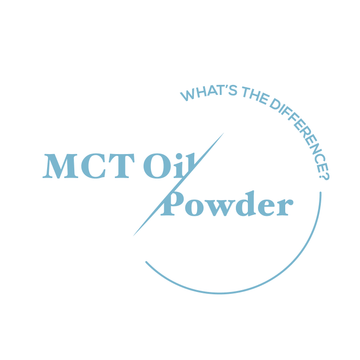One of the most common questions I usually get about MCTs is what’s the difference between MCT oil and MCT powder? Which is better for my body? Medium-chain triglycerides are a type of fat that can provide unique health benefits including improved concentration, weight control and an immediate source of energy. There are two different types of MCT supplements: MCT Oil and MCT powder. What’s the difference and which is better? I’m going to break down the differences between the two and hopefully, you can choose what’s the best option for you and your body!
What are MCTs?
Medium Chain Triglycerides or MCTs are a type of fat-containing 8 to 12 carbon atoms, as opposed to the more common, long-chain fats like olive oil and butter which contain 16 to 20 carbon atoms. The two most common sources of MCTs are coconut oil and palm oil. Because of the unique structure and shorter length of MCTs, they are digested differently in the human body. MCTs digest much quicker than other types of fat, as they are easily absorbed into the bloodstream and go straight to the liver where they are either used as an instant source of energy or turned into ketones. Ketones are substances that can be used by the brain for energy. This is why MCTs have promising health benefits and have been praised for their ability to help improve brain function, increase exercise performance, aid in weight loss, among other things. [Click the link for a more in-depth breakdown of MCTs and brain health].
What’s the Difference Between MCT Powder and Oil?
Because of the recent interest in and promising health benefits of MCTs, MCT supplements have become readily available and quite popular among nutritionists and health enthusiasts. The two options available are in a powder and oil form.
MCT Oils
MCT oils have been used therapeutically for a few years to help treat and reduce symptoms of common diseases like epilepsy, fat malabsorption syndrome and Crohn’s disease. It should not be used as a replacement for cooking oils as it does not respond to heat very well, but it can be used in salad dressings or as a replacement for any other topical oils. There are a few disadvantages of choosing an oil over a powder. MCT oil is more likely to cause stomach upset, it is a little bit more difficult to take with you on-the-go and it is not easily blended into smoothies or shakes without using a blender. However, generally, oils are less expensive per serving than powders and most of the research on MCTs has been conducted using oil, not powder.
MCT Powders
MCT powder is manufactured from MCT oil through a process called spray drying. The end result of spray drying is a white powdered form of MCT that is more convenient, easier to digest, and can easily be combined with other supplements like collagen powders. There are numerous ways to incorporate MCT powder into your diet including adding to hot or cold beverages, baking or desserts, soups and sauces, and of course pre- or post-workout shakes and smoothies.
 What’s the Same?
What’s the Same?
MCT oils and powders have similar nutritional value and health benefits. Both are shown to promote weight control, improve concentration and focus, and may increase energy levels during exercise. Furthermore, MCT oil and powder are both vegan, keto and paleo friendly; making them accessible to be used in a wide range of diets.
The Bottom Line
Both MCT oil and powder can be a valuable addition to any diet! Choosing between the two is usually just a matter of preference. In my opinion, MCT powders are a bit more convenient for a modern lifestyle. Click the link if you would like to learn more about AURA MCT Energy powder. We would love to know what you think!

Kirstin Berrington is an AURA Team member with a passion for all things nutrition and health. As a nutritionist, she is equipped with a B.Sc. in Human Nutritional Sciences to help answer all your food-related questions.


 What’s the Same?
What’s the Same?




